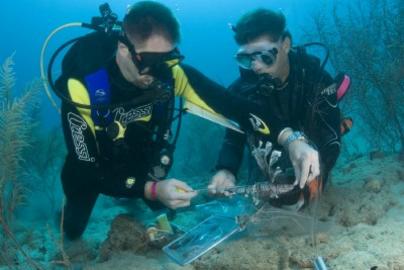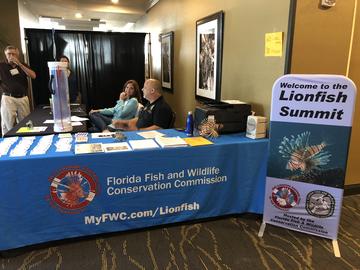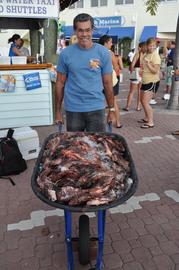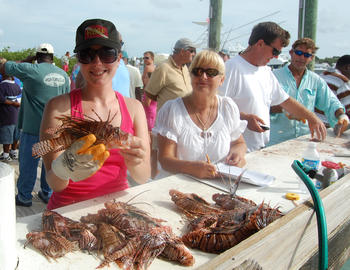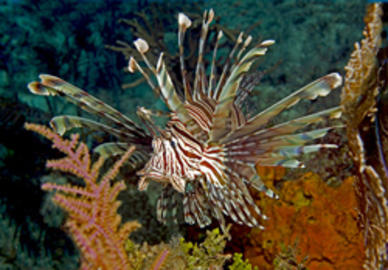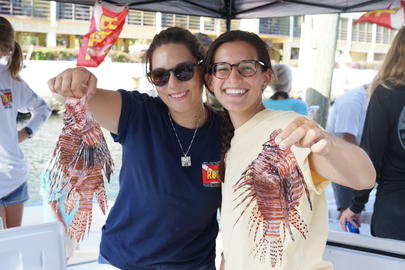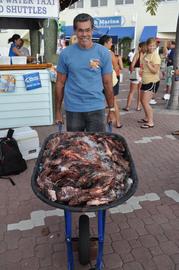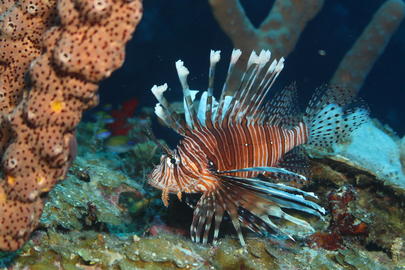Native to the Indo-Pacific, two species of lionfish (Pterois miles and P. volitans) have recently become established along the east coast of the U.S., Bermuda, Bahamas, and the north-central Caribbean. Their expansion through the Caribbean is occurring at a rapid pace and recent studies have demonstrated significant impacts of lionfish on native reef fish communities. REEF and NOAA researchers have documented more than 50 species of prey from lionfish stomachs including some commercially valuable species of grouper and snapper.
On October 2-4, REEF’s Invasive Species Program Coordinator, Dr. Alli Candelmo, and Environmental Leadership Intern, Sophie Costa, joined regional researchers, invasive species managers, divers, and ocean conservationists at the Florida Fish and Wildlife Commission 2018 Lionfish Summit. The summit addressed three main themes: Policy & Regulation, Control Efforts/Research & Monitoring and Education & Outreach. Alli presented as an invited speaker on the trends of ten years of REEF lionfish derbies and lionfish movement patterns and the application to improving removal efforts.
In the summer of 2014, recreational divers in Florida and the Bahamas will once again assemble teams, scout out hundreds of sites, sharpen their spears, ready their nets, and hone their collecting skills to prepare for another REEF summer lionfish derby series. Six years ago, REEF began hosting lionfish derbies throughout Florida and the Caribbean to address the lionfish invasion.
Our Invasive Lionfish Research Program is keeping busy getting ready for the spring and summer. In addition to the tagging research in the USVI also reported in this month's E-News, we are also gearing up for a busy Lionfish Derby season. We have six derbies planned in Florida for REEF’s 2018 Lionfish Derby Series presented by Whole Foods Market®. These competitions encourage teams to collect and remove as many lionfish as possible. They are important education and outreach events, and have been shown to be quite effective in lowering local lionfish populations.
Lad Akins, REEF Director of Special Projects, recently co-authored a paper summarizing work documenting feeding patterns of lionfish in the Bahamas. Understanding the predation behavior of this invasive species is important to be able to predict and mitigate the effects of Indo-Pacific lionfish (Pterois volitans) on Caribbean fish communities. Lad and his colleagues at Simon Frasier University studied the activity levels and prey consumption rates of lionfish on 12 shallow coral reefs in the Bahamas in relation to time of day and prey availability.
Kick off your summer by joining us for the Miami Lionfish Derby on June 10! We are excited to be hosting this event in partnership with Phillip and Patricia Frost Museum of Science. Thank you to Whole Foods Market® for sponsoring our 2018 Lionfish Derby Series.
Below is a schedule of events for this weekend's Miami Lionfish Derby. We hope to see you there!
Friday, June 8: Captain's Meeting at 6:30 p.m. at Phillip and Patricia Frost Museum of Science. This meeting is mandatory for all derby participants.
Ground-breaking invasive lionfish findings were featured in a paper published earlier this month in the scientific journal, Ecological Applications. The research was conducted as a collaboration between REEF, Oregon State University, Simon Fraser University, and the Cape Eleuthera Institute. The new study, conducted by Dr. Stephanie Green (OSU/REEF), Lad Akins (REEF), and others, confirms for the first time that controlling lionfish populations in the western Atlantic Ocean can pave the way for a recovery of native fish.
We are excited to share a new scientific paper that was published in the journal Global Change Biology last month. Researchers used REEF’s Volunteer Fish Survey Project database to answer crucial questions about the impacts of invasive lionfish as their range expands into new areas, such as Brazil. It is well known that predation by lionfish affects native fish populations, and this impact is likely exacerbated in certain vulnerable species.
|

